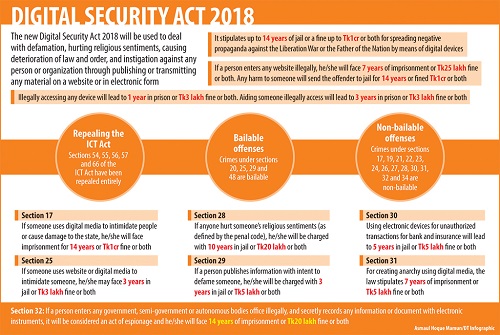Bangladesh's president signed on Monday a digital security act into law on Monday despite protests by journalists and rights groups that it will severely curb media freedom.
“The digital security bill has been signed by the president today,” President Abdul Hamid's spokesman Joynal Abedin told AFP.
Top editors and journalists had a last-minute meeting with government ministers demanding that some sections of the legislation be changed.
The law minister promised that he would discuss the issues but the president went ahead and signed the act into law without waiting.
The law, which carries heavy jail sentences for secretly recording government officials or spreading “negative propaganda” using a smartphone or computer, already had parliamentary approval. Berlin-based corruption watchdog Transparency International's (TI) Bangladesh chapter slammed the move in an immediate reaction.
Hundreds of journalists have staged demonstrations against the law in recent days and editors have said the law poses serious threats to freedom of expression and media in the country.
Prime Minister Sheikh Hasina in a press briefing last week backed the law. She told journalists that “if there is no criminal mind, there is no reason to worry”.
According to the Digital Security Act 2018, a journalist could be convicted of espionage for entering a government office and gathering information secretly using an electronic device, an offence that would carry a 14-year jail sentence.
It also provides for similar sentences for spreading “negative propaganda” about the country's war of independence or its founding leader Sheikh Mujibur Rahman using a digital device.
The law was enacted months after top Bangladeshi journalist and activist Shahidul Alam was arrested during massive student protests in the capital Dhaka for making “false” and “provocative” statements on Al Jazeera and Facebook Live.
- AFP

The digital security law in Bangaladesh
Leave Comments